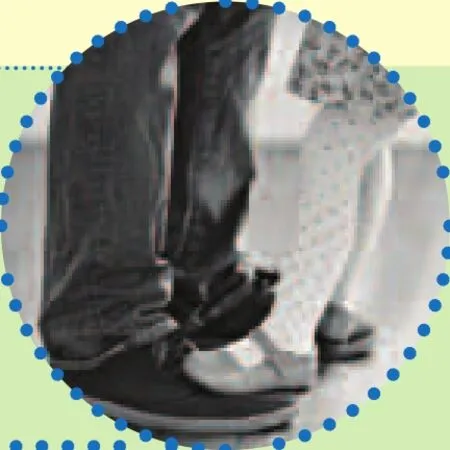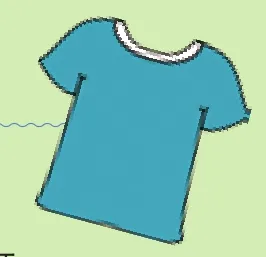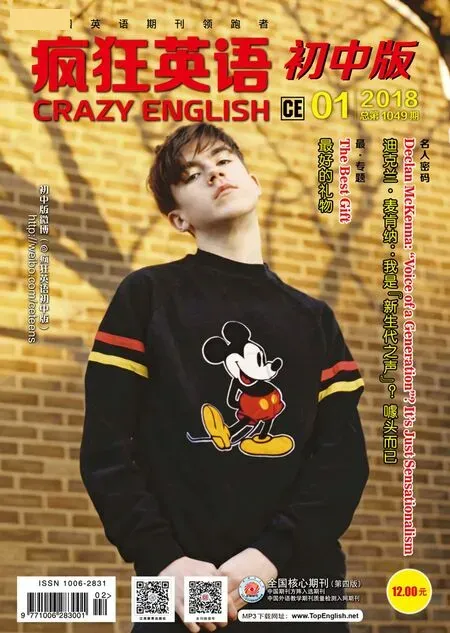My Favorite Shirt
Track 10
by M. Stanley Bubien
翻译:范婕

有没有过这样的经历:当你与朋友的关系不如以前亲密时,对方的一点点示好都会让你高兴半天。如果这种情况出现在孩子和父母之间会发生什么呢?来听听一位父亲的自述吧!

“No!” my daughter shouted. “I don’t want to!”
“Come on, Victoria,” I said gently with arms1)outstretched, “just one hug.”
“No!” she said, and shook her head wildly.
I knew it was a2)stage, but it still hurt. Sheused tohug me. I guess Itookthatfor granted, never thinking it would stop—my only real3)intimacywith her.
“Maybe she doesn’t feel good,” my wife offered.
I shook my head.
The next morning I heard my wife shouting, “Victoriathrew upin her bed.”We both knew who was going to stay home—my wife had an early meeting.
Even if she refused to hug me, I stillenjoyedbeing with my daughter. Ispentthe morning reading her stories and listening to music while she played with dolls. Around noon, she became4)anxious.
“Daddy, my stomach hurts,” she finally said.
Ipickedherup. When her head touched my shirt, I heard a horrible5)retching.Turning to the side, I saw yellow6)fluid rolling offmy shoulder. Running into the bathroom, Ileaned overthe7)counteras Victoria threw up again. This time, I let it roll down my arm and into the8)sink.
“It’s okay, honey. I have you,” I9)whispered,10)swallowingagainst tears of my own.
“I11)ruinedyour shirt, Daddy,” Victoria cried.
“Oh, it’llwash off,” I comfort her.
But I was wrong. It didn’t wash off.However, I still wore the shirt for years afterward.
1) outstretched [,aʊt'stretʃt] adj. 伸展的
2) stage [steIdʒ] n. 阶段
3) intimacy ['IntIməsI] n. 亲密,亲近
4) anxious ['æŋkʃəs] adj. 焦急的,流露出忧虑的
5) retching ['retʃIŋ] n. 干呕
6) fluid ['fluːId] n. 液体
7) counter ['kaʊntə] n. 工作台
8) sink [sIŋk] n. 水池,洗涤槽
9) whisper ['wIspə] v. 低声说
10) swallow ['swɒləʊ] v. 吞,忍住
11) ruin ['ruːIn] v. 破坏,毁灭

参考译文
“不!”女儿大喊道,“我不想拥抱!”
“来嘛,维多利亚,”我张开双臂,温柔地说,“就抱一下。”
“不要!”她答道,使劲摇头。
我知道这是女儿成长过程中的一个阶段,不过心里还是觉得不好受。她过去还常常和我拥抱,那是我和她唯一实实在在的亲密接触,现在想想那时候自己把和女儿的拥抱当成了理所当然的事情,从没想过有一天这种亲密接触会不复存在。
“也许她身体不太舒服。”妻子这样安慰我。
我摇了摇头。
第二天早上,我听见妻子喊着:“维多利亚在
词组加油站
take…for granted认为……是理所当然的
throw up呕吐
pick up接起
roll off滚落下来
lean over弯下身子

wash off洗掉,洗去她床上吐了。”我和妻子都知道两人中谁将留在家里——妻子上午有个早会要开。
虽然女儿不愿意和我拥抱,我还是非常享受和她待在一起。一整个早上,我读了读她的故事书,听了听音乐,她就在一边玩娃娃。快到中午的时候,她变得焦躁不安起来。
“爸爸,我肚子痛。”她终于说道。
我把女儿抱了起来。她的头刚一碰到我的衬衫,我就听到猛烈的呕吐声。扭头一看,只见黄色的液体从我的肩膀上流了下来。我抱着女儿赶紧跑进洗手间,朝洗手台靠过去,维多利亚又吐了起来。这次,我让呕吐物顺着我的手臂流进了池子里。
“没事,亲爱的,爸爸抱着你。”我轻声说,自己却在强忍泪水。
“爸爸,我把你的衬衫毁了。”维多利亚哭着说道。
“哦,能洗干净的。”我安慰她道。
但是我错了。上面的痕迹没有洗掉。可是那件衬衫我后来仍然穿了很多年。

名师考点小结
1.used to do sth.意为“过去常常做某事”,表示过去习惯性、经常性的动作或状态,侧重于过去与现在的对比,暗指现在已经不存在。used无人称和时态的变化。例如:
I used to go there on Saturday, but now I seldom do so. 过去我经常星期六去那儿,但现在我很少去了。
拓展:
(1) used to的否定式可为“used not to”,也可为“didn’t use to”。例如:
I didn’t use to eat meat.
=I used not to eat meat. 我过去不常吃肉。
(2) used to的疑问句式也有两种:“ Did...use to?”或“Used...to?”例如:
Did he use to be good at study?
=Used he to be good at study? 他过去成绩不错吗?
2.enjoy意为“喜欢,享受……的乐趣”,其后可接名词、代词或动名词作宾语,但不可以接不定式作宾语。例如:
Did you enjoy your summer holiday?
你暑假过得好吗?
We both enjoy listening to light music.
我们俩都喜欢听轻音乐。
拓展:enjoy oneself意为“玩得高兴”,相当于have a good time/have fun。其中oneself与主语在数上保持一致。例如:
We enjoyed ourselves in the park yesterday.
昨天我们在公园玩得很愉快。
3.spend意为“花费,度过”,其过去式为spent。后接动词时要用动名词形式。“spend...on sth.”(在某方面花费时间或金钱),“spend...(in) doing sth.”(做某事花费多长时间或多少金钱)。例如:
I spent all my money on books.
我把所有的钱都花在了买书上。
She spent all her time in playing the piano.
她把她所有的时间都花在了弹钢琴上。

